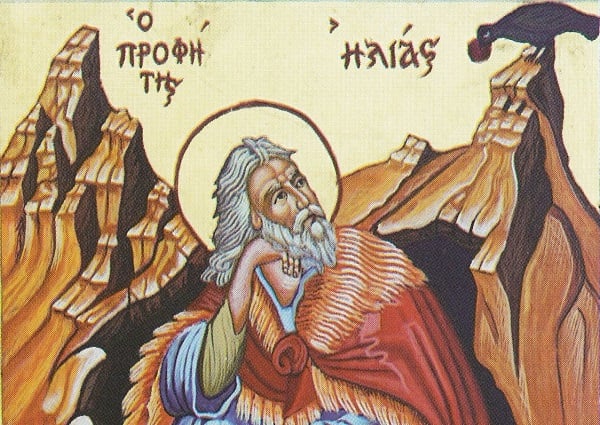Wanted: Elijah (Georgios Ant. Galitis)
22 Ιουλίου 2018
Elijah the Zealot. ‘The angel incarnate and rampart of the prophets’. There’s not a location in Greece that doesn’t have a church, or at least a chapel, a shrine, in his honour. He’s also similarly honoured in all Orthodox countries and in the Christian world in general. The numbers of those who bear his name are equal to those of any of the other popular saints. Not even the patriarch Abraham, nor Moses, who saw God, nor the stentorian prophet Isaiah who foretold the good news, have touched the devotion of the people to the extent that Elijah has. Only Elijah has stirred such piety. Why should this be? To what is this special affection due? Is it the sense of the enduring message of his ministry? Is it the warmth of his zeal, his unwavering steadfastness, his relentless opposition to any kind of wickedness, his merciless critique of state arbitrariness. Things we long for eternally but never see realized.
Whatever answer we give, even the prosaic ones given by social anthropologists, what is of real interest is the message. A message which is particularly topical.

Parallel times
The monarchical state established by the great David and secured by Solomon the Wise, was divided in the 10th century B.C., the consequences being as one might expect: civil strife was only just avoided and national divisions remained deep. Within each of the two new kingdoms, there was no lack of conflict, which was often bloody.
In the Northern kingdom, which was called ‘Israel’, the situation was hopeless. Arbitrary actions on the part of the state, corruption and an organized effort to distance the people from the values of their forebears. People gradually began to be influenced by the religions and customs of the surrounding nations, with the result that their national identity and character was being changed. Things came to a head when King Ahab (873-854) married Jezebel, the dynamic daughter of the King of Tyre. As a ‘dowry’, Jezebel brought with her the worship of Baal Melqart, which she wished to make the official state religion. She undermined the faith of the people in any way she could, assassinated religious leaders, destroyed the holy places and raised altars to the Phoenician gods in their place. A great many people abandoned the worship of the one God and converted to this foreign polytheism.
The prophet’s rebuke
This is when Elijah made his appearance. He appeared before Ahab and rebuked him in the strongest terms, thus drawing down upon himself the wrath of Jezebel. Elijah hid on Mount Horeb.
In the meantime, corruption flourished and was centred on the palace. When, through devious means and corrupt collaborators, citizens and government functionaries, as well as clever misinformation of the people, Ahab and Jezebel managed to siphon off the wealth of an innocent citizen and to have him murdered in a most ‘legitimate’ way, Elijah emerged from his isolation. He returned to his public rebukes, appeared before Ahab and chastised him in the harshest language, so much so, indeed, that he reduced the king to a wreck.
The zealous prophet has gone down in history as an eternal symbol of the unremitting fighting spirit.
The prophet is missing
Does all this remind you of anything? If so, we can talk about parallel times. The difference being that we’re missing a prophet. We, too, have experienced bloody internecine clashes and catastrophic national divisions. Arbitrariness, corruption, the systematic undermining of the values and faith which supported and nourished our people, hostility towards the Church and disdain for its leaders, dubious ploys, wrongful appropriation of other people’s wealth, corruption in the public service and the judicial system, unjust decisions, an organized effort to blur the national character and to change our identity, all in the name of an incomprehensible multi-culturalism and overweening globalization. All of the above undermine the morale of the nation and threaten its existence, as was the case in the time of Ahab and Ahaziah.
Then God sent Elijah…
If the times are, indeed, parallel, let us hope that God will send an Elijah to us, too. Someone with fiery rhetoric, godly zeal, a steadfast spirit, an unflinching critic of any and all wrong-doing, and an incorruptible scourge of deviation. Is it too much to ask? Is it expecting utopia? Or are we so far gone that all hope is forlorn?
In any case, Elijah’s a wanted man.





